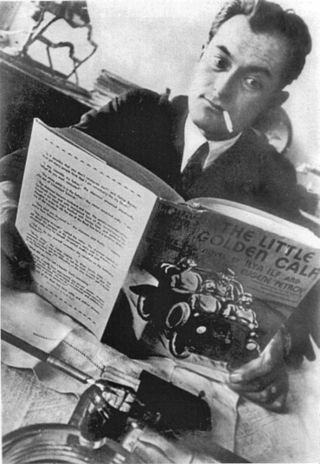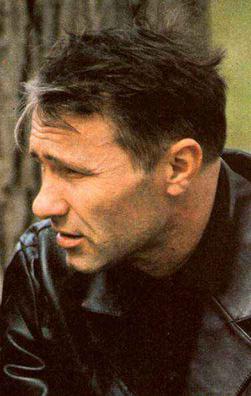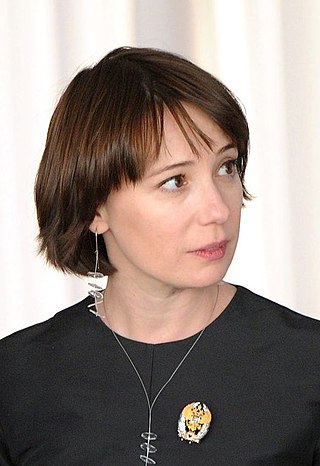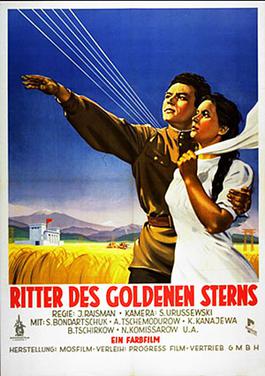Related Research Articles

The Little Golden Calf is a satirical picaresque novel by Soviet authors Ilf and Petrov, published in 1931. Its main character, Ostap Bender, also appears in a previous novel by the authors called The Twelve Chairs. The title alludes to the "golden calf" of the Bible.

Vasily Makarovich Shukshin was a Soviet Russian writer, actor, screenwriter and film director from the Altai region who specialized in rural themes. A prominent member of the Village Prose movement, he began writing short stories in his early teenage years and later transition to acting by his late 20s.

Chulpan Nailevna Khamatova is a Russian actress.

Mikhail Alexandrovich Ulyanov was a Soviet and Russian actor who was one of the most recognized persons of the post-World War II Soviet theatre and cinema. He was named a People's Artist of the USSR in 1969 and a Hero of Socialist Labour in 1986 and received a special prize from the Venice Film Festival in 1982.

The Golden Eagle Award is an award given by the National Academy of Motion Pictures Arts and Sciences of Russia to recognize excellence of professionals in the film industry, directors, actors, and writers. Modelled after the American Golden Globe Awards, the formal ceremony at which the awards are presented is one of the most prominent award ceremonies in Russia, alongside the Nika Award.

Leonid Vyacheslavovich Kuravlyov was a Soviet and Russian film actor. He became a People's Artist of the RSFSR in 1976.

Sverdlovsk Film Studio is a Russian film studio based in Yekaterinburg. It is a regional studio, that was established on 9 February 1943 in the midst of World War II. In 1944 the studio produced its first film, Silva, a musical comedy based on the Austrian operetta Sylva.

Dauria is a 1971 Soviet historical adventure drama set in Siberia, Russia. Adapted from the novel of the same name by Konstantin Sedykh and directed by Viktor Tregubovich.

Dream of a Cossack is a 1951 Soviet drama film directed by Yuli Raizman based on the novel The Golden Star Chavalier by Semyon Babayevsky. It was entered into the 1951 Cannes Film Festival.
Leonid Davydovich Lukov was a Soviet film director and screenwriter. He directed 25 films between 1930 and 1963. Leonid Lukov was named People's Artist of the RSFSR in 1957 and awarded the Stalin Prize twice: in 1941 and 1952. He died in Leningrad.

Pavel Yurievich Derevyanko is a Russian theatre and film actor.
The Golden Eagle Award for Best Motion Picture is one of twenty award categories presented annually by the National Academy of Motion Pictures Arts and Sciences of Russia. It is one of the Golden Eagle Awards, which were conceived by Nikita Mikhalkov as a counterweight to the Nika Award established in 1987 by the Russian Academy of Cinema Arts and Sciences.
The Golden Eagle Award for Best Foreign Language Film is one of twenty award categories presented annually by the National Academy of Motion Pictures Arts and Sciences of Russia. It is one of the Golden Eagle Awards, which were established by Nikita Mikhalkov as a counterweight to the annual Nika Awards given by the Russian Academy of Cinema Arts and Sciences. It is the only category of the Golden Eagle Award that honors non-Russian-language films.
The Golden Eagle Award for Best Television Motion Picture is one of twenty award categories presented annually by the National Academy of Motion Pictures Arts and Sciences of Russia. It is one of the Golden Eagle Awards, which were conceived by Nikita Mikhalkov as a counterweight to the annual Nika Awards given by the Russian Academy of Cinema Arts and Sciences.
The Golden Eagle Award for Best Leading Actress is one of twenty award categories presented annually by the National Academy of Motion Pictures Arts and Sciences of Russia. It is one of the Golden Eagle Awards, which were conceived by Nikita Mikhalkov as a counterweight to the Nika Award established in 1987 by the Russian Academy of Cinema Arts and Sciences.
The Golden Eagle Award for Best Original Score is one of twenty award categories presented annually by the National Academy of Motion Pictures Arts and Sciences of Russia. It is one of the Golden Eagle Awards, which were conceived by Nikita Mikhalkov as a counterweight to the Nika Award established in 1987 by the Russian Academy of Cinema Arts and Sciences.
The Golden Eagle Award for Best Animated Feature Film is one of twenty award categories presented annually by the National Academy of Motion Pictures Arts and Sciences of Russia. It is one of the Golden Eagle Awards, which were conceived by Nikita Mikhalkov as a counterweight to the Nika Award established in 1987 by the Russian Academy of Cinema Arts and Sciences.

Lidiya Nikolayevna Fedoseyeva-Shukshina is a Russian actress and widow of writer, actor and director Vasily Shukshin. She is the mother of actress and TV presenter Maria Shukshina.
The Golden Eagle Award for Best Leading Actor is one of twenty award categories presented annually by the National Academy of Motion Pictures Arts and Sciences of Russia. It is one of the Golden Eagle Awards, which were conceived by Nikita Mikhalkov as a counterweight to the Nika Award established in 1987 by the Russian Academy of Cinema Arts and Sciences.

Erwin Knausmüller was a Soviet stage and film actor of Austrian origin.